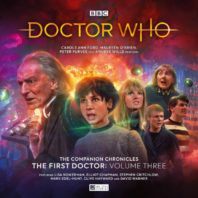
Released September 2019
SOME SPOILERS FOLLOW
Heroism and villainy are attributes as old as time itself, and chronicles of associated deeds serve as both inspiration and warnings for later generations hoping to learn from the past to ensure the best possible future. In John Pritchard’s ‘Daybreak,’ Vicki finds herself squarely in the middle of a war from far in her past that has spurred such diametric tales, but with the conflict ongoing and the saga’s end not yet written, she learns firsthand that context and perspective can cast a shadow over everything assumed to be true.
‘Daybreak’ is a story that perfectly fits within the First Doctor era since it features no aliens or science fiction elements other than the TARDIS bringing the companions to this time, and setting this war in Vicki’s past but in the future of Ian and Barbara gives Vicki as the sole companion of focus here a unique perspective that wholly justifies this story’s format without suffering from either too many or else oddly omitted perspectives from the others. Set within a totalitarian state at a time when an insurgent force is just about to set the wheels of freedom into motion, Vicki is initially thrilled to meet the idols whose legacies endured the test of time and still serve as an inspiration in her age, but when she herself is brought before the Iron Judge whom- along with the Protector- history has cast in a much more negative light, she suddenly finds herself confronting a series of events that is nothing like she knows to be true.
Maureen O’Brien has always been a standout star in The Companion Chronicles, and she gives an immense performance here that encompasses an incredible range of emotion as Vicki struggles to cope with an ever-changing and nuanced truth. This performance is all the more powerful when paired with Clive Hayward who distinctively and powerfully plays both the Judge and Marcus, one of the rebels, to truly flesh out the layered dynamic in play. This is perhaps best realized when Vicki and the Judge essentially circle around each other while holding firm to their beliefs and offering a counterargument to every accusation or intimation made by the other. Both sides of the conflict are allowed to develop and to be explained in equal measure with their strengths and flaws both on display, and it’s that measured approach that makes ‘Daybreak’ much more effective than simply portraying another oppressed population taking back its freedom. Instead, the Judge presents a perfectly logical and understandable voice of reason that Vicki admits is nothing like she expected, and as events unfold differently than how history has remembered them, she must confront the possibility that her own past will likewise change as she begins to imagine the potential ramifications these changes will have both on the population at large and on the Judge’s own punitive response.
It would be easy to dismiss these events as simply being cogs in the unchanging machinery of history given the course that events take and the very personal involvement that Vicki unwittingly ends up having in them, but the callback to the Doctor’s own insistence that not one line of history can be changed in ‘The Aztecs’ as well as the brilliant riddle that frames this narrative that studies the perspectives of those who emerge from a war or dirty situation help to create a profound backdrop to these events that only Vicki truly knows. ‘Daybreak’ is a very deliberate yet emotional study about motivations and viewpoints and how both can change when assumptions and biases are dismissed and the bare facts are observed, and the brilliant performances and direction secure this story’s understated power that is a beacon of the genuine potential that The Companion Chronicles as a range is still more than capable of delivering.
- Release Date: 9/2019


Leave a Reply